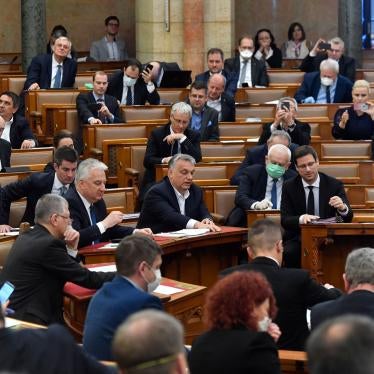Ministers in charge of EU Affairs
EU Member States
June 15, 2020
Dear Minister,
We write to urge your support for the European Commission’s proposal for a new regulation on the protection of the Union's budget in case of generalized deficiencies as regards the rule of law in the Member States, that would allow the Commission to tie the allocation of EU funds to member states to their respect for the rule of law. Specifically, the proposed regulation would allow the Commission to suspend or cut funding under existing commitments, as well as the prohibition to conclude new commitments, following an assessment of generalized deficiencies as regards the rule of law in a member state.
In the past decade, the European Union has faced a steady erosion in some of its member states of respect for the rule of law and democratic principles on which the Union is based and has seen EU leaders undermining the checks and balances that protect human rights and the rule of law against executive overreach.
In Poland, the government has eroded the independence and effectiveness of the judiciary and is threatening to discipline and sanction judges. Authorities supported campaigns targeting independent groups working on women’s, LGBT, and migrants’ rights, corroding the EU’s common values of non-discrimination and tolerance. In Hungary, the government’s interference with the judiciary is just one of the efforts to limit its own accountability. Authorities criminalized legitimate humanitarian activities, singled out organizations that receive funding from abroad, and smeared domestic and international nongovernmental organizations. Hungarian authorities have decimated media pluralism and destroyed academic freedom, forcing a university out of the country and increasing control over public universities. The governments of both countries used Covid-19 as an excuse to further weaken democratic institutions.
While Article 7 proceedings remain the central instrument to hold states accountable for breaches to the principles included in the TEU Article 2, we believe there should be other consequences when EU member states blatantly fail to respect and uphold the core EU values and commitments upon which membership of the EU is conditioned.
The Commission’s proposal reflects the fact that an independent judiciary protects the rule of law, and that democratic checks-and-balances help hold governments to account. These are necessary conditions to ensure EU funds are not misused and diverted by member states from their purpose as a result of rule of law deficiencies. An even more serious concern is that funds could be misused to generate breaches to the rule of law or fundamental rights.
The proposed mechanism would provide the Commission with leverage over member states that have ignored its calls to uphold judicial independence, the rule of law and fundamental rights, addressing one of the biggest weaknesses of the current framework.
Furthermore, the use of a reverse qualified majority to cut or suspend funds, as proposed by the Commission, provides a safeguard that such decisions could be taken arbitrarily by setting an appropriately high threshold to ensure that measures taken are specific and proportionate to the impact of the rule of law deficiency identified by the Commission while protecting such decisions from political bargains among member states.
While calling on member states to adopt the Commission’s proposal alongside the EU’s 2021-2027 Multi-Annual Financial Framework, we also urge your government to support the following additional recommendations in order to strengthen the proposed mechanism:
• Expand the scope of rule of law deficiencies: The regulation should avoid too narrow an interpretation of the rule of law, and clearly include violations of freedom of expression, freedom of association and assembly, and media freedom within the scope of the rule of law deficiencies that may trigger the mechanism. Obstacles to media freedom and freedom of association can have a negative impact on the capacity of independent monitors to hold governments accountable without fear of retaliation. The situations in Hungary and Poland demonstrate that attacks on the judiciary go hand in hand with efforts to limit media pluralism and to prevent activities of nongovernmental organizations working on critically sensitive issues.
• Conduct a human rights assessment prior to triggering the mechanism: The European Commission should be tasked with carrying out a prior human rights impact assessment to determine the risk of individuals’ rights being directly harmed by any decision to cut, suspend, postpone or divert funding. The Commission should also make concrete recommendations about how such risks would be prevented or mitigated, by, for example, supporting efforts by civil society and other groups, involving local institutions and municipalities when possible, or proposing to revise budget lines in order to administer or channel EU funding to ensure that beneficiaries’ rights are not affected.
• Ensure coherence with other tools and mechanisms: The mechanism for the protection of the EU budget from rule of law deficiencies should be built in coherence with other existing rule of law tools. Decisions taken through this mechanism should draw from and act on the concerns identified by the Council, the Commission or the Parliament within the on-going Article 7 proceedings or concerns raised in the context of the EU Framework to strengthen the Rule of Law. Going forward, the rule of law deficiency mechanism should also build on the assessment, the conclusions and the recommendations of the annual report to be published by the European Commission under the newly established Rule of Law Review Cycle. It should also take into consideration concerns raised by the Fundamental Rights Agency, the Council of Europe, including its Venice Commission, and UN human rights monitoring mechanisms.
Finally, member states should encourage the European Commission to use its existing authority under the Common Provisions Regulation to strengthen its monitoring of the current use of EU funds.
The European Commission rightly pointed out in its July 2019 ‘Blueprint for Action’ that “the European project relies on permanent respect of the rule of law in all Member States.” It was similarly right to stress, when presenting its proposal to tie access to EU funding to respect for the rule of law, that respect for the EU values must be ensured “throughout all Union policies,” including its budget.
It is more fundamental than ever to protect Europeans from the rise of autocratic governance at the expense of democratic values and respect for human rights. Alongside the political will to re-energize Article 7 proceedings and an effective Rule of Law Cycle report, ensuring that access to EU funds is tied to respect for fundamental EU values that all member states agree to when becoming part of the union, can be a game-changer to effectively protect the rule of law and fundamental rights.
Yours sincerely,
Hugh Williamson
Director, Europe & Central Asia Division
Human Rights Watch







